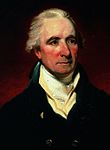Irish general election, 1797
|
|
||||||||||||||||
|
|
||||||||||||||||
|
|
||||||||||||||||
|
All 300 seats of the House of Commons 151 seats were needed for a majority |
||||||||||||||||
|---|---|---|---|---|---|---|---|---|---|---|---|---|---|---|---|---|
|
||||||||||||||||
The 1797 Irish general election was the last general election to the Irish House of Commons, with the Act of Union three years later uniting the Kingdom of Ireland with the Kingdom of Great Britain. The election followed the Roman Catholic Relief Act 1791, meaning it was the first election in which Catholics could vote, provided they met the property requirements. The election also coincided with simmering rebellion in Ireland, with the following year witnessing the Irish Rebellion of 1798.
Despite its heavily political backdrop, the election was marked most by the apathy shown to it by Ireland's electorate.
The election took place at a time of increasing unrest in Ireland. The preceding years had seen both the growth of the Society of United Irishmen within Ireland, as well as the beginning of the French Revolutionary Wars in Europe. Ulster in particular saw increasing unrest, with low level conflict between the Catholic Defenders and the Protestant Peep o' Day Boys. Both Irish and British Whigs were united in their opposition to the Irish security policies of the Pitt Government, and the Whigs also held the ear of the Prince of Wales through his close friend Lord Moira, thereby seemingly allowing Irish Whigs to enter the election in a strong position.
The Lord Lieutenant closed parliament on 3 July 1797, and dissolved it on 11 July, thereby calling a general election.
The United Irishmen considered running Lord Edward FitzGerald and Arthur O’Connor as candidates for the constituencies of Antrim and Down respectively, and in preparation organised meetings of freeholders in Armagh, Antrim and Down calling for the removal of the Castle junto. Father James Coigly played an active role in this campaign, distributing printed notices throughout Armagh and encouraging freeholders ‘to attend to their duty’. He also likely authored the anonymous pamphlet, "A view of the present state of Ireland with an account of the origin and progress of the disturbances in that country," which was heavily praised by James Hope.
...
Wikipedia


